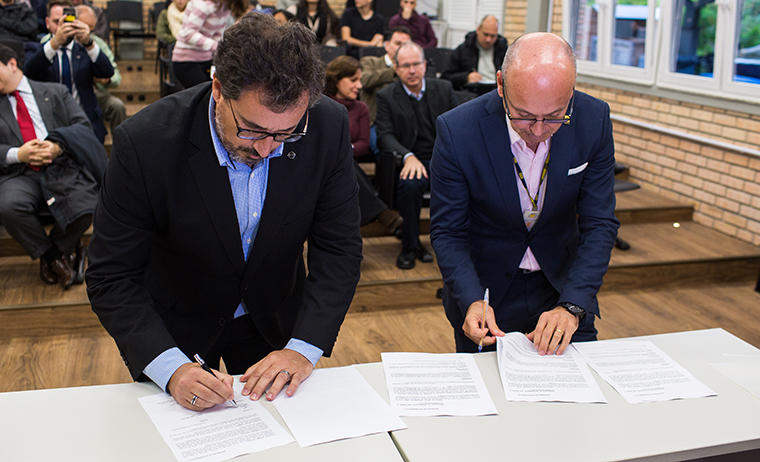Car manufacturer Nissan's Brazilian business and the Federal University of Santa Catarina (UFSC) have signed a memorandum of intent for the cooperation on research regarding the second-life use of EV batteries for energy storage.
According to Nissan, the partnership will aim to explore the use of end-of-life EV batteries in static storage systems, with the carmaker stating EV batteries are capable of storing enough electricity to power an average household (5.66kWh/day) for around three days.
“Worldwide, Nissan has been forming partnerships with the purpose of integrating electric vehicles with society and promoting electric mobility,” said Nissan Brazil President Marco Silva. “Upon removal, the batteries retain a high charging and supply capacity. In Brazil, joint efforts alongside researchers of the Federal University of Santa Catarina will be essential for testing the batteries' full potential.”
The university’s PV laboratory has installed a storage system of second-life EV batteries, to work alongside its rooftop solar system.
“This partnership with Nissan is very important for our laboratory because it will allow us to unite the two pillars of our research, which are electric mobility and energy storage,” said UFSC Laboratory Coordinator Ricardo Rüther. “We are excited about the wide array of possibilities to repurpose these batteries.”
EV batteries power street lighting
This year Nissan has demonstrated projects for the second-life applications of batteries from its popular Leaf models. For example in the Netherlands, the company has installed a system of 148 batteries in Amsterdam’s Johan Cruijff Arena. In Japan the carmaker has reportedly equipped lampposts with solar panels and second-life EV batteries.
Recently a London-based research and consulting group published a study that estimated the second-life EV battery market will grow to $4.2 billion by 2025. According to the study, EV manufacturers are seeking to keep the batteries in use longer to reduce the costs of removal and recycling, a legal duty placed on the producers.
The analysts spelled out the business case for deploying second-life EV batteries in the U.K. speculating a supplier of reserve capacity through a multi-MW storage system would earn around £50,000 ($65,000) per MW, per year. Under that model, a 100 MW plant made of 7,000 Nissan Leaf batteries would generate annual revenue of $6.7 million – translating into $965/battery/per year. For the estimated five-year remaining life-cycle of batteries after their EV use, each would yield $4,825.
In Germany the business case would be even more attractive, according to the report, as frequency regulation prices are higher. A plant of the same layout in Germany would generate $18 million per year, with each battery yielding around $14,130 during its five-year second life.
This content is protected by copyright and may not be reused. If you want to cooperate with us and would like to reuse some of our content, please contact: editors@pv-magazine.com.




1 comment
By submitting this form you agree to pv magazine using your data for the purposes of publishing your comment.
Your personal data will only be disclosed or otherwise transmitted to third parties for the purposes of spam filtering or if this is necessary for technical maintenance of the website. Any other transfer to third parties will not take place unless this is justified on the basis of applicable data protection regulations or if pv magazine is legally obliged to do so.
You may revoke this consent at any time with effect for the future, in which case your personal data will be deleted immediately. Otherwise, your data will be deleted if pv magazine has processed your request or the purpose of data storage is fulfilled.
Further information on data privacy can be found in our Data Protection Policy.